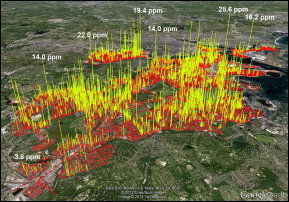Dominion Energy has announced a plan to reduce methane emissions from its natural gas infrastructure by 50% from 2010 levels over the next decade. The voluntary initiative will prevent more than 430,000 metric tons of methane from entering the atmosphere, the equivalent of taking 2.3 million cars off the road or planting nearly 180 million new trees.
“We recognize we need to do more to reduce greenhouse gas emissions to further combat climate change,” said Diane Leopold, President and CEO of Dominion Energy’s Gas Infrastructure Group. “We’ve made significant progress, but we’re determined to go much further..”
The Richmond-based energy company did not say how much it expected to spend on the initiative. Assuming a value of $5 per million BTUs, and a conversion rate of roughly 50 million BTUs per ton, the projected savings to the company would amount to about $250 per ton or $107.5 million.
The initiative addresses a major criticism of the natural gas industry: that, although gas combustion releases less CO2 than coal combustion, when leaks from gas pipeline infrastructure are taken into account, the switch from coal to natural gas does little to combat global warming. Methane is a far more potent greenhouse gas than CO2. (That particular framing of the issue does not take into account methane emissions from coal mines, some of which vent massive quantities of methane.)
Dominion, which maintains one of the largest gas pipeline networks in the country, is positioning the initiative as part of a broader policy to reduce greenhouse gases including CO2. The plan builds on previous measures that have cut methane emissions by 180,000 metric tons.
Dominion touted the methane-reduction initiative as raising the bar for the natural gas industry. The company said it will pursue three broad strategies:
- Reducing or eliminating gas venting during planned maintenance and inspections.
- Replacing older equipment across its system with new, low-emission equipment.
- Expanding leak detection and repair programs across its system.
“Thanks to advances in technology and innovations in our operating procedures, we can capture methane on a much larger scale than we could have ten years ago,” said Mark Webb, Dominion Energy’s Chief Innovation Officer in the announcement. “We’ve tested and proven these technologies in some parts of our infrastructure, and now we’re dramatically expanding them across the entire system.”
Leopold cited a program to replace natural gas-powered pumps at gas-producing wells with solar-powered electric pumps, which reduce methane emissions by more than 90%.
The announcement did not mention how the program might affect the proposed Atlantic Coast Pipeline compressor turbine in the African-American Union Hill community of Buckingham County. Local residents had asked Dominion to use solar power to drive the pumps rather than natural gas, the emissions from which they claimed could impact the health of local residents.
“Dominion Energy’s announcement to cut methane leakage and venting is an impactful, cost-effective solution to address climate change,” said Bob Perciasepe, president of the Center for Climate and Energy Solutions (successor to the Pew Center on Global Climate Change). “Their targeted strategy to cut their methane emissions in half through better venting practices, installation of new equipment, and enhanced leak detection with advanced infrared flare cameras is an example of clear, positive steps that can be taken by companies with natural gas assets to reduce their emissions footprint.”
Update: The Chesapeake Climate Action Network derides the Dominion initiative as “laughable.” Stated Virginia Director Harrison Wallance in a statement issued this afternoon:
“Nice try. The best way for Dominion to reduce methane emissions is to abandon its plans to build its controversial and unnecessary $7.5 billion pipeline. Dominion’s announcement will avoid 430,000 metric tons of methane from entering the atmosphere (36.98 million tons of C02e) over the ten-year period. The ACP will far more than offset that gain, emitting nearly 68 million metric tons of planet-warming gases (C02e) into the atmosphere on an annual basis.
“It’s refreshing that Dominion acknowledges that methane is harmful to our planet. But, if Dominion wants to make real and significant progress towards a stable climate, they should stop building the ACP and killing ambitious clean energy measures in the General Assembly. We’ll know they’re serious about climate change if they start taking meaningful action to build a grid that is powered by 100% renewable energy.”



